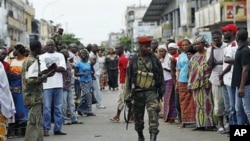Ivory Coast President Alassane Ouattara is being called on to bring to justice to those who allegedly committed human rights abuses and crimes against humanity.
A letter to Mr. Ouattara from Human Rights Watch [HRW] describes Ivory Coast as a “deeply fractured nation still reeling from months of violence.” The violence erupted following last November’s elections when then-president Laurent Gbagbo lost the vote but refused to step down.
“Ouattara takes the oath of office on Saturday after six long months of post-election violence. It’s absolutely necessary he hold perpetrators on both sides to account for the grave crimes that have been committed here,” said Matt Wells, spokesman for Human Rights Watch in the commercial capital, Abidjan.
HRW accuses pro-Gbagbo forces of crimes against humanity, while forces loyal to Ouattara are accused of “grave” war crimes.
Wells said both sides need to be held responsible “to show Ouattara represents all in Cote d’Ivoire and that the rule of law will finally return to this country that suffered so much.”
But how?
HRW said there are “deepening divisions along communal lines” and called for a “credible truth-telling mechanism” and a “professional and independent judiciary.”
“If Ouattara can show that all those that are guilty of these grave crimes will be equally held to account, that it’s not just one side that’s being blamed for all that’s happened, that will go a long way toward healing a lot of the divisions that formed during this very bloody crisis,” said Wells.
Rebuilding the Judicial system will take time
“Certainly, after 10 years of crisis here the judicial system is in shatters. In the far west of the country, in the northern part of the country, there really hasn’t been a judicial system for the better part of a decade now,” he said, adding, “Rebuilding a lot of the courts that have been destroyed, redeploying trained judicial officials, is crucial in ensuring that they are … sufficiently staffed to prosecute the grave crimes that have been committed.”
Prosecuting those responsible
HRW said it has interviewed “hundreds of victims and witnesses to egregious violations…massacres, enforced disappearances, killings and sexual violence.”
“We’ve been here since the start of the crisis,” said Wells. “We’ve undertaken three missions to Abidjan, as well as two to the far west along the Ivoirian-Liberian border.
The International Criminal Court [ICC] could also take action regarding Ivory Coast.
“It’s been a welcome sign that President Ouattara himself has actually asked the International Criminal Court to investigate,” said Wells, “And certainly the…court could play a strong role in ensuring that an impartial justice is done in Cote d’Ivoire. But domestic prosecutions are also essential.”
The ICC, if involved, may only take up a handful of cases, leaving most of the prosecutions to the Ivoirian legal system.




